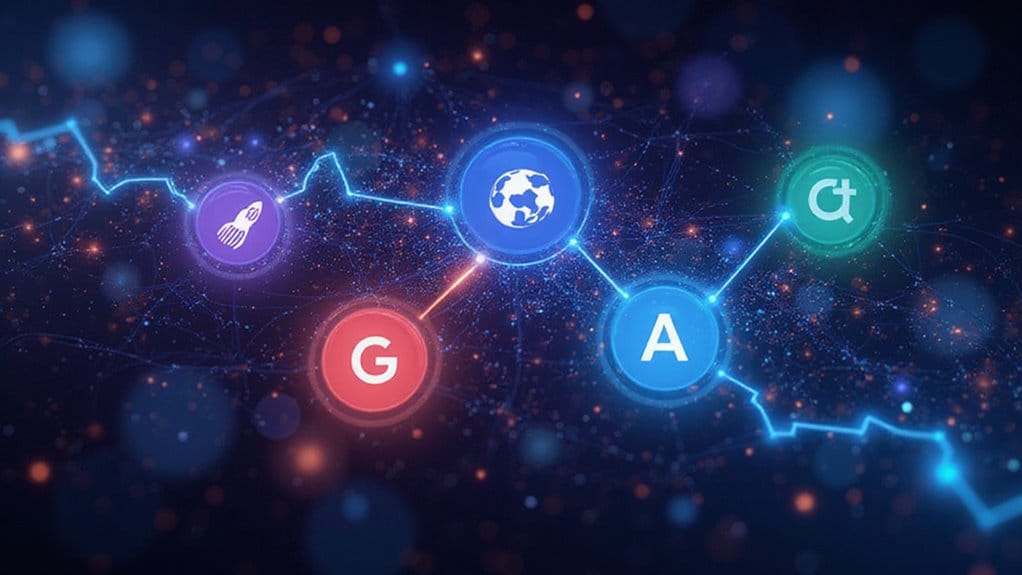AI is shaking up the finance industry like a snow globe! It analyzes data faster than you can say “financial forecast,” improving decision-making at lightning speed. Forget lengthy processes; automation cuts down on boring tasks, leaving banks to strategize. Customers enjoy personalized experiences, thanks to AI chatbots that know them better than their best friends. And let’s not forget fraud detection—AI spots it like a hawk. Curious about more AI magic in finance? Stick around!

In today’s fast-paced financial world, where every second counts, it’s important to understand how AI is reshaping the landscape. AI is not just a buzzword; it’s a game-changer in finance. Imagine algorithms dissecting mountains of data faster than you can say “market volatility.” These technologies provide insights that humans simply can’t match, enhancing everything from forecasting to risk assessment.
Let’s talk about operational efficiency. Why waste time on mundane tasks like data entry when AI can handle that? Robotic Process Automation (RPA) and machine learning streamline operations, making banks more productive. Generative AI could even contribute billions annually to global banking. AI is expected to save the banking industry sounds great, right? AI is predicted to become a $130 billion industry by 2027, revolutionizing financial management.
AI revolutionizes operational efficiency in banking, eliminating mundane tasks and paving the way for billions in annual contributions.
But hold your horses! With great power comes great responsibility. Enter AI regulation and ethical considerations. As AI becomes a staple in finance, we need to guarantee it operates within safe boundaries. Who’s watching the watchmen?
Now, consider personalized customer experiences. Picture a chatbot that knows your financial history better than your best friend. That’s AI at work, tailoring advice just for you, improving customer satisfaction, and keeping folks engaged. Banks like Bank of America are already reaping the benefits of this technology.
But let’s not forget the risks. What if that AI misses something significant? Ethical considerations in AI use are imperative to avoid potential pitfalls, like biased loan approvals.
Risk management is another area where AI shines. Machine learning algorithms can sift through data, identifying trends and risks that might escape human analysts. Companies like AlphaSense are harnessing this power to make smarter decisions.
But don’t get too comfortable! Continuous monitoring is important to catch fraud before it strikes. AI can save businesses billions by detecting anomalies in real-time.
Frequently Asked Questions
How Does AI Impact Financial Job Opportunities and Employment?
AI is reshaping financial job opportunities, leading to both job displacement and skill evolution.
Sure, some roles will vanish—about 54% of banking jobs could face automation.
But don’t panic! New positions—like AI specialists and data scientists—are popping up.
Embrace the change! Focus on gaining analytical skills, as human judgment becomes essential.
Remember, while some jobs may disappear, others will require your creativity and strategic thinking.
Adapt or get left behind!
What Are the Ethical Concerns Surrounding AI in Finance?
Ethical concerns in finance with AI? Oh, they’re a big deal!
First, consider bias mitigation. If AI learns from biased data, it can make unfair decisions—yikes!
Next, transparency issues arise when you can’t see how decisions are made. Want to avoid a disaster? Guarantee AI systems are interpretable.
And remember, compliance with regulations isn’t optional. So, stay informed, demand clarity, and keep pushing for fairness in every transaction!
How Does AI Ensure Data Security in Financial Transactions?
AI guarantees data security in financial transactions through clever encryption techniques that scramble sensitive information, making it nearly impossible for hackers to decipher.
Ever worry about fraud? AI’s fraud detection systems analyze patterns like a detective on a sugar rush, spotting suspicious activity before it spirals out of control.
Can AI Predict Economic Recessions or Market Crashes Accurately?
Can AI accurately predict economic recessions or market crashes? Absolutely, but it’s not magic. Through recession forecasting, AI analyzes tons of financial data, spotting trends and anomalies that humans might miss. Think of it as a crystal ball, but one that uses algorithms instead of mysticism. By leveraging advanced models, AI helps investors make timely decisions. Don’t ignore these warnings—being proactive can save you from financial disaster. Trust the numbers!
What Regulatory Challenges Does AI Face in the Finance Industry?
AI in finance faces serious regulatory challenges, folks!
Think regulatory compliance is just a buzzword? Think again! With data privacy laws like the Gramm-Leach-Bliley Act looming, financial institutions must tread carefully.
Existing frameworks aren’t quite cutting it; they need updates!
And let’s not forget about those pesky AI biases—who wants an unfair system?









